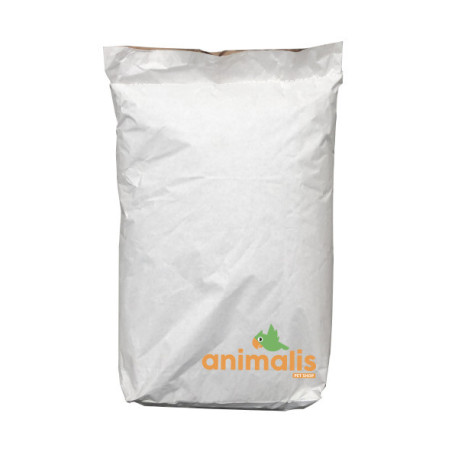





Reference: SARRASIN15KG
Buckwheat is a seed that is very low in fat but rich in carbohydrates. This seed is ideal for feeding show finches and European birds.
Buckwheat is a seed that is very low in fat but rich in carbohydrates. This seed is ideal for feeding show finches and European birds.
Buckwheat is a nutritious seed often included in the diet of cage and aviary birds.
- Appearance: Buckwheat is a triangular seed, light brown to greyish in colour, with a slightly rough shell.
Benefits for Birds:
- Balanced Nutrition: Buckwheat offers a combination of proteins, carbohydrates, and fibres, contributing to a balanced diet.
- Energy: The complex carbohydrates provide a sustainable source of energy for the birds' daily activities.
- Digestive System: The fibres promote good digestion and a healthy intestinal regulation.
- Proteins: The proteins in buckwheat support growth, reproduction, and the maintenance of muscle mass in birds.
Baked and crumbled wheat biscuit.
Rusk is particularly suitable for the absorption of moisture in food.
Also ideal for mixing additives (vitamins, dyes, etc.) in food
Ideal for moistening egg pie.
Composition: wheat, water, salt and yeast.
Chia is sage. It is an annual plant up to 1 m tall whose scientific name is Salvia hispanica.
The composition of chia seed closely resembles that of other mucilaginous seeds such as flaxseeds and psyllium. Unlike flaxseed, however, chia does not have anti-nutritional factors, factors that limit the use of flaxseed without prior hot treatment. Anti-nutritional factors are cyanogenic glycosides or linatins, inhibitors of vitamin B6 that prevent its action. Chia also has a much more pleasant taste than flaxseed and birds consume it more willingly.
Millet is used in the diet of all birds: straight beaks and hooked beaks. In bunches, it's a treat they love.
Cluster millet has a good protein and carbohydrate content and also contains a large number of amino acids. Ideal for distracting your birds and thus avoiding pecking (feather pulling).
Millet is used in the diet of all birds: straight beaks and hooked beaks. In bunches, it's a treat they love.
Cluster millet has a good protein and carbohydrate content and also contains a large number of amino acids. Ideal for distracting your birds and thus avoiding pecking (feather pulling).
We advised giving red millet for exotic birds. It is richer in protein than yellow millet.
The flaxseed consists of 40 to 45% oil and 25% protein. Flaxseed preserves very well. It contains, in particular, two fatty acids with similar names (both derived from the word "lin"), linolenic acid (an omega-3) and linoleic acid.
The seed is used in animal feed, particularly for laying hens for which an increase in the omega-3 content of the eggs is desired.
Due to these properties, this seed aids digestion.
A 100% natural product that is mixed with breeding or with food; It doubles in size by adding water.
Carrots are very rich in vitamins with a high proportion of vitamin A and carotene, as well as vitamin B, calcium and valuable carbohydrates.
Soya beans are an excellent source of iron, zinc, manganese, copper, selenium, potassium, vitamins, fibres, polyunsaturated fatty acids, and antioxidants; in short, they are an excellent dietary supplement.
Soya beans are often used in sprouting seed mixes.
Paddy rice seed or raw rice is perfectly suitable for exotic birds with strong beaks such as the Java sparrow and Asian-origin birds. This seed is also appreciated by parakeets, parrots, and exotic doves.
Dari, also known as sorghum or millet, is a variety of grain that is related to millet varieties. Dari is the size of a hemp seed. The grain originates from the warm regions of Australia, Asia, Africa, and South America. There are three varieties: white dari, yellow dari, and reddish-brown dari. It is noteworthy that more value is attributed to light dari than to reddish-brown dari. Regarding nutritional value, there is not the slightest difference. Furthermore, reddish-brown dari is well appreciated by lovebirds. Dari can be compared to wheat in terms of starch content. The seed has a favourable composition of amino acids. The protein present in dari has a particularly high leucine content.
Niger, birdseed rich in phosphorus and calcium. Niger seeds (or nyjer seeds) are fine seeds rich in oil. They come from Guizotia abyssinica (also known as Guizotia oleiferous). The niger is highly prized by most birds, goldfinches and siskins love it.
The seed is mainly grown in India, Burma, Ethiopia and Nepal. Niger is an oilseed with a high fat content (38-43%) and protein content (23%). It provides quality food for all species of wild and forest birds, both in dry and sprouted form.
Niger is one of the few birdseeds with a good ratio of calcium to phosphorus.
Peeled peanuts are very popular treats for parrots.
They are to be distributed sparingly because they are rich.
Ideal food to fill your wild bird dispensers, they will bring the necessary fat to the birds to spend the winter more easily.
The favorite of chickadees and a real treat for many birds.
Properties of Pine or Larix seeds.
Anti-inflammatory, analgesic, antispasmodic,
Antiseptic, anti-infectious (pneumococci),
Decongestant of the small pelvis and prostate,
Diuretic
Expectorant, tonic for the respiratory organs.

Buckwheat is a seed that is very low in fat but rich in carbohydrates. This seed is ideal for feeding show finches and European birds.
